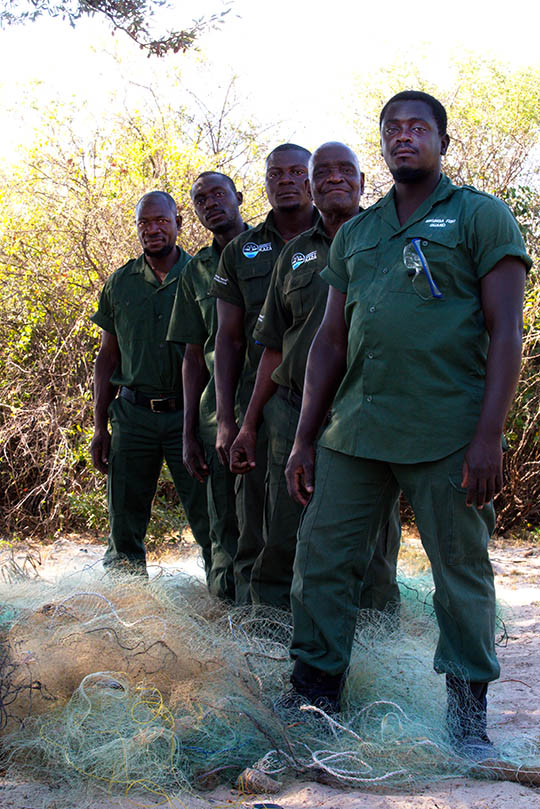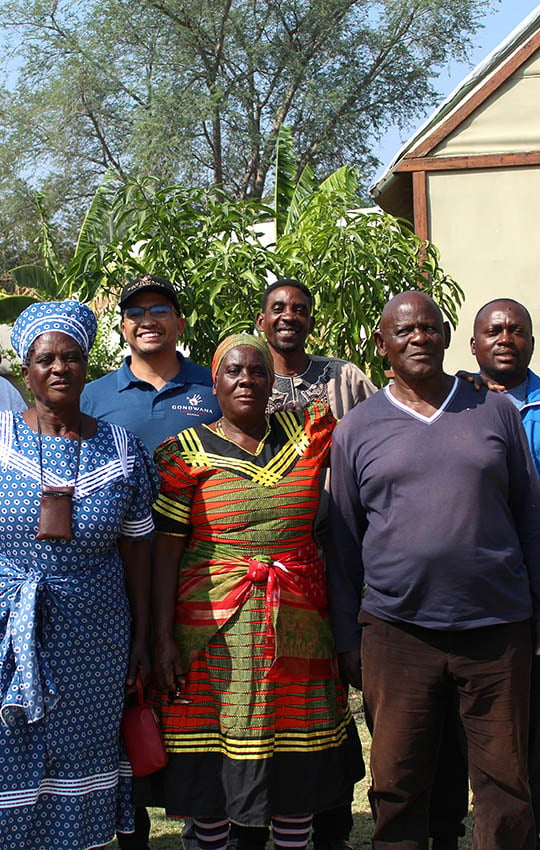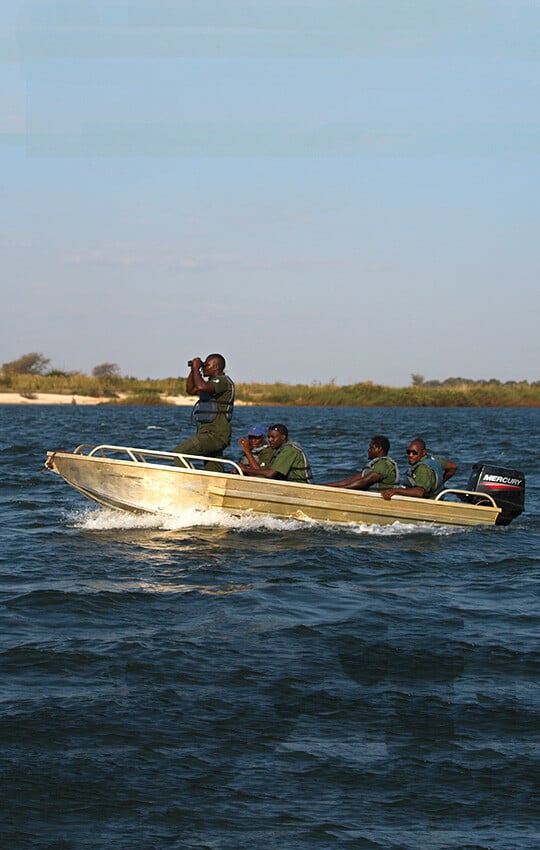Why Namibia Looks the Way It Does
When you look at a map of Namibia, its shape is instantly recognisable – a bulky,...
We are dedicated to building equitable and sustainable partnerships with the lively communities in which we operate. Our commitment to community impact is rooted in the belief that people helping people is the key to creating a better future for all. We have expanded our reach into the communal areas in the northern, north-eastern, and north-western parts of Namibia through joint venture agreements with conservancies and traditional communities.
These partnerships ensure that a fair share of the financial benefits derived from our lodges go to the respective conservancies and communities. Our approach also guarantees local employment and empowerment, based on a sound Conservancy Employment and Skill Development Plan. We believe that investing in people is the most effective way to uplift communities and create a more equitable society. Our lodges situated in communal areas include:
Chobe River Camp in the Salambala Conservancy
Zambezi Mubala Lodge & Camp in the Sikunga Conservancy
Namushasha River Lodge & River Villa in the Mashi Conservancy
Hakusembe River Lodge in the Mbunza Traditional Community
Etosha King Nehale in the King Nehale Conservancy
Omarunga Epupa-Falls Camp in the Epupa Conservancy
Palmwag Lodge & Camp working with the Torra, Anabeb, and Sesfontein conservancies
Through these partnerships, we are committed to empowering local communities, ensuring they directly benefit from the tourism activities in their regions. By working together with conservancies and traditional authorities, we strive to create a more equitable and sustainable future for all. We also prioritise cultural preservation and ethical sourcing, ensuring that our operations respect and support local traditions and practices. Our commitment to education and awareness helps us engage with local communities, fostering a deeper understanding and appreciation for the natural and cultural heritage of Namibia, aiding realization of Sustainable Development Goal 8: Decent Work and Economic Growth and Goal 11: Sustainable Cities and Communities.
The Sikunga Fish Protection Project plays a vital role in conserving the aquatic ecosystem of the Zambezi River, particularly in the Sikunga area of Namibia. This initiative is crucial for maintaining fish populations and supporting the livelihoods of local communities that depend on fishing.
The Zambezi River is not only a significant waterway in Southern Africa but also a habitat for diverse fish species. Overfishing, habitat degradation, and environmental changes threaten these species, which impacts both biodiversity and the local economy. The Sikunga Fish Protection Project was established to address these challenges by implementing sustainable fishing practices and protecting fish populations.
The primary objectives of the Sikunga Fish Protection Project include:
Conservation of Fish Species: The project aims to protect endangered and overfished species, ensuring their populations can thrive. This involves monitoring fish stocks and implementing measures to prevent overfishing.
Community Engagement: Engaging local communities is crucial for the project's success. The Sikunga project involves educating fishermen about sustainable practices and the importance of conserving fish habitats. By fostering a sense of ownership among the community members, the project encourages responsible fishing behavior.
Sustainable Livelihoods: The project seeks to promote alternative livelihoods for local communities, reducing their dependence on fishing. This can include eco-tourism initiatives and training in sustainable agricultural practices, providing communities with diverse income sources.
The Sikunga Fish Protection Project employs various strategies to achieve its objectives:
Impact of the Project
The Sikunga Fish Protection Project has made significant strides in promoting sustainable fishing practices and protecting the Zambezi River's ecosystem. Some of the notable impacts include:
Increased Awareness: There is a growing awareness among local communities about the importance of fish conservation. Fishermen are more informed about sustainable practices, leading to a reduction in overfishing and habitat destruction.
Improved Fish Populations: Preliminary data indicates that fish populations in the Sikunga area are beginning to recover, thanks to the protective measures implemented by the project. This recovery is vital for maintaining the ecological balance of the river.
Enhanced Livelihoods: By promoting alternative livelihoods and sustainable practices, the project has helped improve the economic stability of local communities. This diversification reduces reliance on fishing and contributes to overall community resilience.
The Sikunga Fish Protection Project exemplifies a successful approach to balancing conservation with community needs. By protecting fish populations and engaging local communities, the project not only contributes to the health of the Zambezi River's ecosystem but also supports the livelihoods of those who depend on it. Continued efforts in education, monitoring, and community involvement will be essential for the project's long-term success and the sustainability of the region's aquatic resources.

In the realm of sustainable tourism, the relationship between lodges and conservancies is crucial for fostering mutual benefits. Gondwana Collection Namibia exemplifies this through its commitment to building stable, trust-based partnerships with the conservancies in which it operates. By engaging extensively with local communities and conservancies, Gondwana ensures that both parties reap the rewards of their joint ventures, creating a sustainable model for conservation and community development.
Building Trust Through Engagement
At the heart of Gondwana's approach is the establishment of stable relationships characterised by open communication and collaboration. Regular Joint Management Committee meetings are held between Gondwana lodges and conservancy partners, allowing for the discussion of concerns and operational issues. This collaborative spirit fosters a sense of ownership among community members, ensuring that they feel invested in the protection and success of lodge operations.
Justice Muhinda, Gondwana's dedicated community liaison officer, plays a pivotal role in these efforts. He engages directly with conservancy leaders, traditional authorities, and community partners, facilitating dialogues that address local needs and aspirations. By ensuring that community voices are heard, Gondwana strengthens its relationships and enhances the effectiveness of its operations.
Fair Distribution of Benefits
A key aspect of Gondwana's partnership model is the fair and transparent distribution of financial benefits to joint venture partners. This commitment not only supports the economic well-being of local communities but also reinforces trust in the partnership. By ensuring that financial returns from tourism are equitably shared, Gondwana empowers communities to invest in their own development and conservation initiatives.
However, challenges remain. Monitoring and managing wildlife crime, including illegal fishing, is essential, particularly in areas where unemployment and poverty exacerbate these issues. By addressing the root causes of wildlife misdeed, Gondwana helps to protect natural resources and maintain the quality of game-watching and fishing activities for guests.
Training for Sustainable Governance
To further enhance the effectiveness of conservancy operations, Gondwana plans to facilitate governance and administration training for community leaders. This initiative aims to strengthen governance structures, improve financial acumen, and develop essential skills within conservancy management. By investing in capacity building, Gondwana ensures that local communities are equipped to manage their resources sustainably and effectively.
Relationship Building Initiatives
Justice Muhinda, has been instrumental in fostering relationships with conservancy and community members. His regular meetings with the Joint Management Committee have addressed operational issues and cultivated a sense of responsibility for lodge operations among local stakeholders.
He organised a tour for leaders of the Bukalo Traditional Authority, which oversees the Chobe River Camp and the Zambezi Mubala Lodge and Camp operations. This tour allowed the traditional leaders to see Gondwana's operations beyond the Zambezi Region, strengthening their relationship with the company and enhancing mutual understanding.
In another occassion, the King Nehale Conservancy Management Committee was hosted by the Etosha King Nehale lodge team for a two-night stay. This visit provided the conservancy management with an opportunity to explore the lodge and its facilities, reinforcing their joint venture partnership. The excursion included a visit to the Ontalelo Hide at Gondwana’s exclusive waterhole inside Etosha National Park, further deepening the connection between the conservancy and Gondwana.
Commitment to Community Development
Gondwana Collection’s investment in conservancies goes beyond operational partnerships. The company is dedicated to community development through various initiatives that enhance local livelihoods. By creating job opportunities and supporting local businesses, Gondwana contributes to economic resilience in the regions where it operates.
The company’s commitment to social investment is evident through its Gondwana Care Trust, which drives community support projects across Namibia. This trust has facilitated numerous initiatives, including educational programs, health services, and infrastructure development, ensuring that the benefits of tourism extend to the broader community.
Gondwana Collection Namibia’s approach to managing conservancy relationships exemplifies the potential for sustainable tourism to create mutual benefits for both businesses and local communities. By fostering trust-based partnerships, ensuring fair distribution of financial returns, and investing in community development, Gondwana not only enhances its operations but also contributes to the conservation of Namibia’s unique natural heritage. As the company continues to strengthen its relationships with conservancies, it sets a benchmark for responsible tourism that prioritises both environmental sustainability and community empowerment. Through these efforts, Gondwana is paving the way for a future where tourism and conservation coexist harmoniously, benefiting all stakeholders involved.

At Gondwana, we believe that stable, trust-based relationships between our lodges and conservancies are essential for mutual benefit. These partnerships enable both parties to thrive through collaboration. As lodge operators, we actively engage with conservancies and rural communities in several meaningful ways:
Joint Management Committee Meetings: We hold regular meetings between Gondwana lodges and their conservancy partners to address community concerns and operational issues.
Community Liaison: Our dedicated community liaison officer, Justice Muhinda, directly engages with conservancy leaders, traditional authorities, and community partners to foster open communication and collaboration.
Fair Financial Distribution: We ensure that financial benefits from our joint ventures are distributed fairly, transparently, and promptly to our partners.
Wildlife Misdeed Monitoring: We monitor and manage wildlife misdeed, including illegal fishing in the Zambezi Region, which often escalates during times of unemployment and poverty. This is crucial for maintaining sustainable natural resources and enhancing the quality of our guests' experiences in game watching and fishing activities.
Relationship Building
Justice Muhinda, our community liaison officer, regularly conducts Joint Management Committee meetings with conservancy and community members at our lodges. These gatherings not only address operational challenges but also foster a sense of ownership and responsibility towards lodge operations.
Additionally, the community liaison officer led a tour for leaders of the Bukalo Traditional Authority, who oversee the Chobe River Camp and Zambezi Mubala Lodge operations. This tour showcased Gondwana's broader operations beyond the Zambezi Region, reinforcing our relationship with the Bukalo Traditional Authority.
Similarly, in December 2022, the King Nehale Conservancy Management Committee was hosted at the Etosha King Nehale for two nights. This visit allowed them to explore the lodge as part of their joint venture partnership with Gondwana. The itinerary included an excursion to the Ontalelo Outpost, an exclusive waterhole within Etosha National Park.
Through these initiatives, Gondwana is committed to nurturing sustainable partnerships that empower local communities while enhancing conservation efforts across Namibia.

When you look at a map of Namibia, its shape is instantly recognisable – a bulky,...
On our route from the Victoria Falls towards Etosha, the Hakusembe River Lodge proved to...
The Desert Whisper is one of the most extraordinary accommodations in Namibia. Around 60...